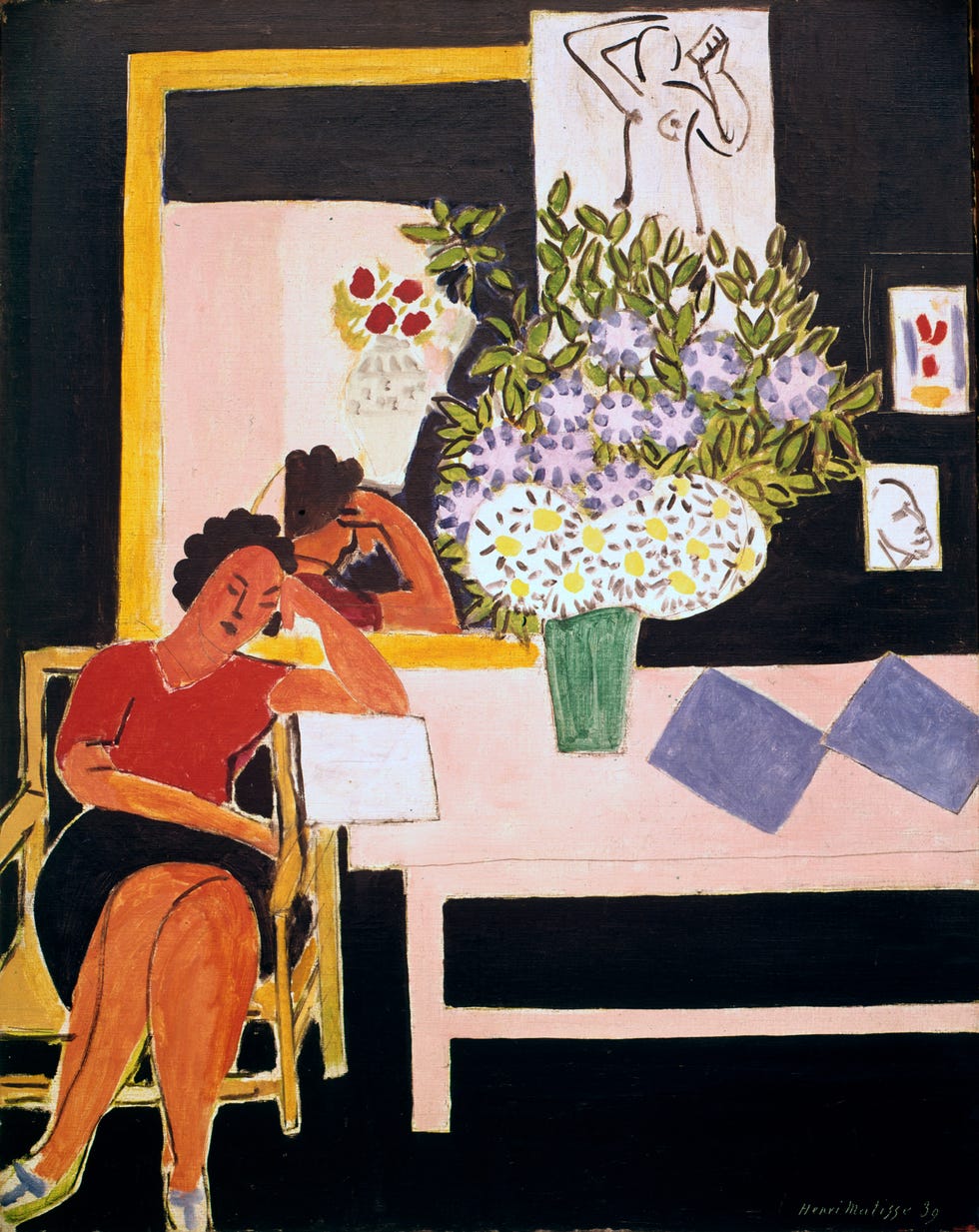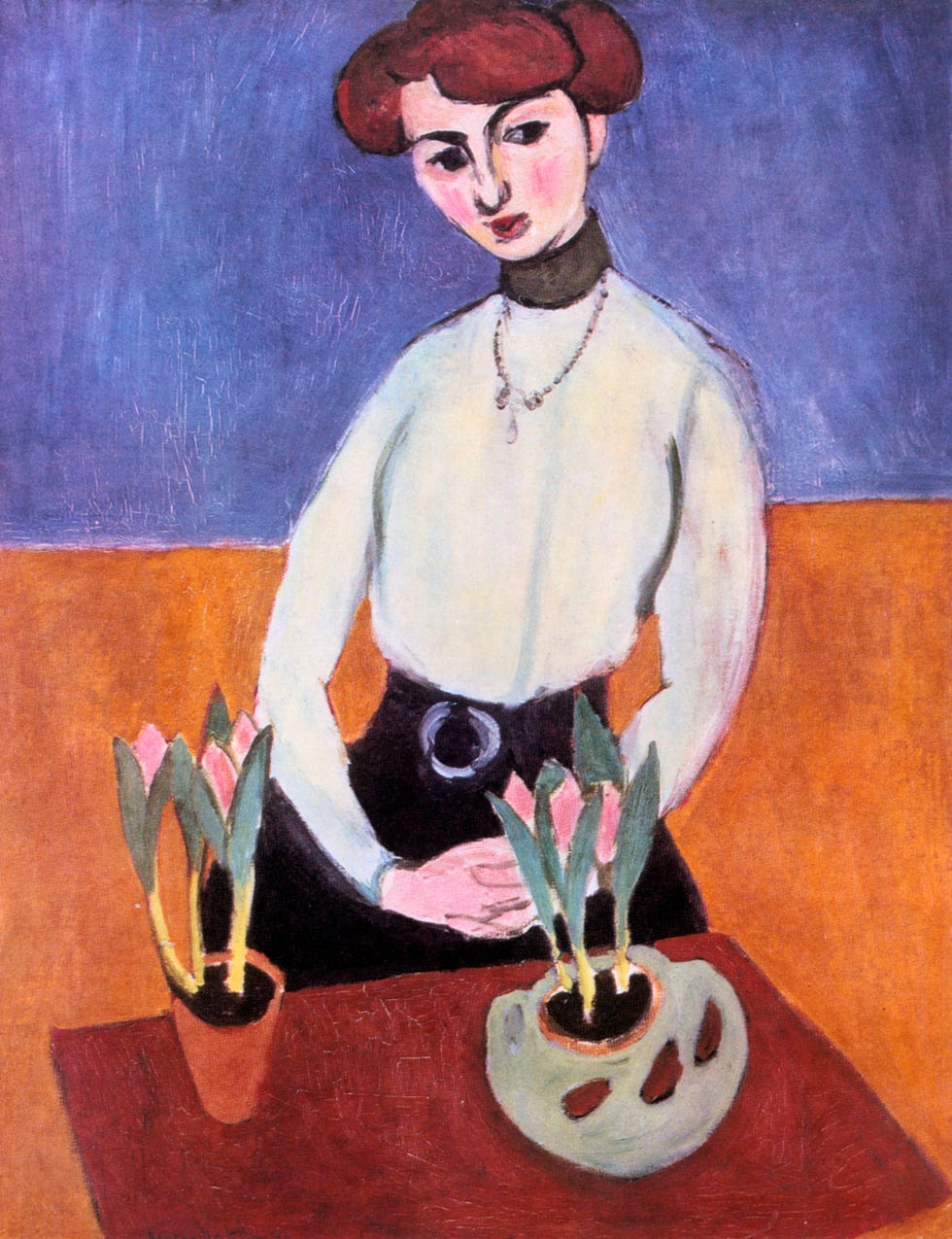Is Perimenopause the Problem? Or Is It Me?

We have reached peak perimenopause. And I don’t mean that I have reached peak perimenopause, though maybe I have, I’m not sure. There’s no definitive test for it, but as the saying goes: “You’ll know it when you see it.” So let’s look in my mirror: I’m 44. Sometimes at night I get hot. I’ve been a bit moody lately. Occasionally, I'll notice something that ordinarily I wouldn’t think twice about—a child holding his mother’s hand, an older couple, deep in conversation—and start to cry, right there on a New York City street. I’m an ice queen by nature, so it’s got to be my changing hormones. Right?
What began a few years ago as an eye-opening conversation about women’s health—no one told us we were going to experience a mini-menopause! A decade before actual menopause! This stinks!—has gone mass, to the point that perimenopause is now just shorthand for “I’m in my 40s.” The watershed moment happened in 2023, when Hollywood babe Naomi Watts went public about her experiences with early menopause, introducing many to the word “perimenopause,” and using her platform to destigmatize this time in a woman’s life, which had previously been only whispered about as “the change.” Shudder.
The same year, a cover story about menopause ran in the New York Times magazine that went into detail about the author’s perimenopause symptoms. Every woman of a certain age and demographic emailed it to each other with subject lines like, “THIS IS WHY I’M SO SWEATY,” and “I’m going on estrogen…right now!” Suddenly it was everywhere: in books (The New Menopause; Hot and Bothered; It’s Not Hysteria; Millennial Menopause), articles, podcasts (“Perimenopause Power,” “Hello, Hot Flash”), and on social media, where funny #perimenopause memes flooded my feed, the algorithm seemingly well aware of both my age and penchant for time wasting.
Perimenopause, for those who are living under a rock—or who are, you know, male—is defined as the years of hormonal fluctuations leading up to menopause, the point at which a woman hasn’t had a menstrual cycle for 12 months. Lately, I cannot attend moms’ drinks without the subject coming up, whether it’s someone sharing how they had to change sweat-soaked pajamas in the middle of the night, or confessing that they screamed at their children in a fit of hormonal anger.

I was at a recent dinner with an old college roommate, and, as is often the case, talk went to perimenopause as we began comparing our symptoms as if rattling off medieval ailments—achy bones; flaky skin; hair loss. We laughed as my friend told me a story about her “gushing blood,” having a grand old time until we noticed that the table of young finance bros next to us was listening in, quaking in fear. (Sorry to ruin your meal, guys, but at some point you too will have a wife who bleeds through her pants. Cheers!) The last time I knew so much about my friends’ menstrual cycles was when we were 12, and it was a question of if you’d gotten it or not. Now it’s a question of: How many times this month? Three?
Women’s reproductive health has been routinely understudied, and so the burst of interest in perimenopause is, on the whole, a great thing. My cohort and I feel lucky that we have information about this life stage that our mothers did not, though at the same time, knowing that we’re entering this process, and all that goes with it, doesn’t exactly feel great, either. We should be at the height of our powers; peak career time, kids who are out of diapers, still relatively attractive. But instead of being able to enjoy it we’re all focused on our inevitable lurch towards the big M. Decline is on the horizon, ruining our day in the sun.
“Now, I can’t just be a 44-year-old woman; instead, I am perimenopausal.”
When women feel out of control—or fat, or ugly, or old—what makes them feel better? Products! Many companies have jumped on the opportunity to profit off of the perimenopause surge, from telehealth startups, to vitamin ventures, to businesses making vaginal gels, hair masks, skin oils, and cooling towels, none of which I have bought, but many of which look bright and fun and cute. By 2033, the global menopause market, which includes products aimed at both perimenopause and menopause, is estimated to be more than $25 billion. There are perimenopause tracker apps, and jewelry that claims to relieve symptoms, and for $19.99, you can buy a Clearblue test to pee on that will inform you where you are in your perimenopause journey. (Instead of indicating you’re pregnant, those two lines now just mean you’re a grump.)
But for all the positives, I can’t get rid of the nagging sense that perimenopause—or rather, Perimenopause™—has gotten out of control, morphing into yet another cultural catchall, putting a medical term on what used to just be called “aging.” Because it has so many potential symptoms—the list includes, among other things, mood swings, low libido, weight gain, sleep disturbances, joint pain, irregular periods, anxiety, depression, memory problems, skin changes—it’s become a kind of dumping ground for the range of normal human emotions and experiences.

I’m reminded of that moment a decade ago, when anyone who was shy, or a little quirky, or couldn’t sit through a movie was suddenly “on the spectrum” or self-diagnosed with ADHD. You couldn’t just be an oddball anymore, it had to be a diagnosable condition. And now, I can’t just be a 44-year-old woman; instead, I am perimenopausal.
When I’m feeling a little bloated? It’s definitely perimenopause, not that cheese plate I devoured. Snappy with my children? Perimenopause—sorry, boys! Woke up in the middle of the night? Pesky perimenopause, certainly not the two large glasses of red wine I had at dinner. Oprah said perimenopause gave her insomnia—“For two years I didn’t sleep well. Never a full night. No peace,” she said. Salma Hayek said it caused her breasts to grow. “A lot of people said that I had breast augmentation, but they have just kept growing. Many, many sizes.” And Gwyneth Paltrow said it made her sweaty and moody: “You’re all of a sudden furious for no reason.”
Some of this is most certainly true. I am definitely hot at random times, and I never used to be hot. And my period is…weird. But let’s say it all together now: It’s not always perimenopause. It can’t be. The fact that I forgot to put cookies in my kid’s lunchbox? I was thinking about something else, and I just, well, forgot. My leg hurts because I banged it into the side of my bed. My skin is dry because I’ve always had dry skin in the winter. My sleep sucks because I’m 44 and not 24, and my mind is circling a drain of mortgages and parent-teacher conferences and unfulfilled career goals instead of just, like, which bar I’m going to that weekend. No supplement is going to reverse that fact, no matter how much I’m willing to pay for it.
Here’s another idea—and we all have to agree to have this be our little secret. I’m not against weaponizing perimenopause when I need to, so long as we’re honest with each other that we’re doing so. I’ll even go one step further and say we deserve this, after everything we’ve been through. Remember when we used to lie about having our periods to get out of swimming at school? And who amongst us hasn’t faked a heavy flow to avoid sex? I’m fine with it if you’re fine with it, but we just can’t tell the men.
The other day, my husband and I got into an argument about something or other, I can’t remember what (brain fog is a symptom of perimenopause). I was dismissive of him and slightly irrational throughout. Afterwards, when I went to apologize, I cited the raging hormones that have besieged my perimenopausal body. “No, Emma,” he said. “That’s just your personality.”
And so then I yelled at him again. Might as well use the excuse while it lasts! After menopause, I’ll just be a regular old bitch again.
Emma Rosenblum is the national bestselling author of Bad Summer People, Very Bad Company, and Mean Moms. She's the former chief content officer at Bustle Digital Group, overseeing content and strategy for BDG’s editorial portfolios. Prior to BDG, Emma served as the executive editor of ELLE. Previously Rosenblum was a senior editor at Bloomberg Businessweek, and before that a senior editor at Glamour. She began her career at New York magazine. She lives in New York City, with her husband and two sons.
elle



